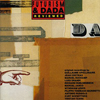 Released by LTM in 2000, Futurism & Dada Revieweddocuments the sonic experiments of these two respective art movements.While the Dadaists were primarily concerned with visual art and theFuturists with politics and literature, both groups were interested inthe burgeoning technology of audio reproduction and the possibilitiesit offered for revolutionary artistic creation. This compilation ofarchival recordings presents a wide variety of the Dada and Futristaudio projects, from sound poems and avant-garde compositions torecordings of interviews and manifestoes by major proponents of bothmovements. Unfortunately, due to the primitive recording technologyavailable during the first half of the 20th century, the poor qualityof these recordings is a constant reminder of the "avant-garde" natureof the work. As far as Futurist compositions on the compilation, all ofthe tracks on Futurism & Dada Reviewed can be found in remastered form on the recent Musica Futuristica,with the exception of Luigi Grandi's "Cavalli + Acciaio." On the Dadaside, the disc presents recordings of poems by Appolinaire, TristanTzara and Jean Cocteau, along with two compositions written by KurtSchwitters and Marcel Duchamp. Duchamp, known as one of the mostinfluential poets of the last century, was also an accomplishedcomposer and his composition "La Mariée mise a nu par ses Celibataires,même" shares its title with one of his most famous paintings. Themethod of composition employed by Duchamp foreshadows those to be usedlater by artists such as John Cage in their use of indeterminatecompositional techniques. Duchamp took numerous balls, assigning eachof them various notes, poured them into a funnel, and then allowed themto drop into the open trucks of a toy train in order to determine thetonal sequence of the composition. While the original version of thiscomposition was originally intended for piano, a new version isincluded on this compilation where the hammers of a piano are replacedwith a small rotary disc that vibrates the strings instead of strikingthem. Kurt Schwitter's composition "Die Sonata In Urlauten" employs thevoice in a variety in nonsensical utterances, song, and child-speak.Listening to Schwitters, it is easy to hear the influence of works likethis on Mike Patton and other contemporary vocal performers. While thequality of the recordings leaves a bit to offer, this compilation isstill of interest to anyone interested in art and music history andoffers a glimpse at groundbreaking compositions that opened up thepossibilities still being explored by contemporary composers andperformers.
Released by LTM in 2000, Futurism & Dada Revieweddocuments the sonic experiments of these two respective art movements.While the Dadaists were primarily concerned with visual art and theFuturists with politics and literature, both groups were interested inthe burgeoning technology of audio reproduction and the possibilitiesit offered for revolutionary artistic creation. This compilation ofarchival recordings presents a wide variety of the Dada and Futristaudio projects, from sound poems and avant-garde compositions torecordings of interviews and manifestoes by major proponents of bothmovements. Unfortunately, due to the primitive recording technologyavailable during the first half of the 20th century, the poor qualityof these recordings is a constant reminder of the "avant-garde" natureof the work. As far as Futurist compositions on the compilation, all ofthe tracks on Futurism & Dada Reviewed can be found in remastered form on the recent Musica Futuristica,with the exception of Luigi Grandi's "Cavalli + Acciaio." On the Dadaside, the disc presents recordings of poems by Appolinaire, TristanTzara and Jean Cocteau, along with two compositions written by KurtSchwitters and Marcel Duchamp. Duchamp, known as one of the mostinfluential poets of the last century, was also an accomplishedcomposer and his composition "La Mariée mise a nu par ses Celibataires,même" shares its title with one of his most famous paintings. Themethod of composition employed by Duchamp foreshadows those to be usedlater by artists such as John Cage in their use of indeterminatecompositional techniques. Duchamp took numerous balls, assigning eachof them various notes, poured them into a funnel, and then allowed themto drop into the open trucks of a toy train in order to determine thetonal sequence of the composition. While the original version of thiscomposition was originally intended for piano, a new version isincluded on this compilation where the hammers of a piano are replacedwith a small rotary disc that vibrates the strings instead of strikingthem. Kurt Schwitter's composition "Die Sonata In Urlauten" employs thevoice in a variety in nonsensical utterances, song, and child-speak.Listening to Schwitters, it is easy to hear the influence of works likethis on Mike Patton and other contemporary vocal performers. While thequality of the recordings leaves a bit to offer, this compilation isstill of interest to anyone interested in art and music history andoffers a glimpse at groundbreaking compositions that opened up thepossibilities still being explored by contemporary composers andperformers.- Marcel Duchamp - La Mariée mise a nu par ses Celibataires, même
- Kurt Schwitter - Die Sonata In Urlauten
- Jean Cocteau - Le Voleur Defants
Read More

